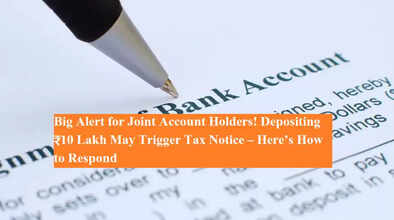Big Alert for Joint Account Holders! Depositing ₹10 Lakh May Trigger Tax Notice – Here’s How to Respond

If you hold a joint bank account, a new provision under the Income Tax rules could land you in unexpected trouble. The Income Tax Department’s Rule 114E(2) mandates that any deposit of ₹10 lakh or more in a joint account will be reported against the PAN (Permanent Account Number) of all account holders—even if the money was deposited by only one person.
This rule is now raising concerns among households, especially homemakers and senior citizens who often have their names added to joint accounts for convenience but may not have any personal income. In many cases, they may even receive tax notices despite having no independent earnings.
What is Rule 114E(2)?
Under Rule 114E(2), banks, post offices, and other financial institutions are required to report all deposits or investments of ₹10 lakh or above to the Income Tax Department.
The unique aspect of this rule is that the reported transaction reflects on the PAN of every joint account holder, not just the depositor.
For example: If a husband and wife have a joint account and the husband deposits ₹10 lakh, the same transaction will also appear on the wife’s PAN, even if she contributed nothing.
Why This Creates Problems
This reporting mechanism often causes confusion for account holders like:
-
Homemakers: Women who don’t have a taxable income but are co-holders in joint accounts.
-
Senior Citizens: Parents or grandparents added as co-holders for ease of operation.
-
Dependent Family Members: Relatives with no earnings but linked to joint accounts.
As a result, their PAN records show high-value deposits or investments, which can trigger automatic notices from the Income Tax Department.
How to Handle a Tax Notice in Such Cases
Currently, the tax system does not automatically distinguish who made the actual deposit in a joint account. Hence, taxpayers are advised to take the following steps:
-
Check Your AIS (Annual Information Statement):
Regularly review your AIS on the Income Tax portal to see if any transactions are wrongly reflected under your PAN. -
Submit Feedback on AIS:
If you see a deposit that doesn’t belong to you, provide feedback on the portal, clarifying that the transaction relates to another joint holder’s PAN. -
Keep Documentation Ready:
Maintain records such as bank statements, proof of income, or transfer details to establish who deposited the money. These can be shown to the tax authorities if required. -
Respond Promptly to Notices:
If you do receive a tax notice, do not ignore it. Respond with the necessary clarifications and attach supporting documents.
Who Does This Rule Apply To?
Rule 114E(2) applies to all joint account holders, not just homemakers or retirees. Every time a deposit of ₹10 lakh or more is made, the entry is reflected against the PAN of every individual linked to that account.
That means anyone—whether earning or non-earning—may face scrutiny if they are listed as a joint account holder.
Precautionary Measures for Account Holders
-
Actively monitor your AIS and Form 26AS to ensure accuracy.
-
Provide timely feedback if incorrect transactions are reported under your PAN.
-
If needed, file your Income Tax Return (ITR) to avoid complications.
-
Keep clear documentation of the source of funds deposited in the account.
Final Word
While the objective of Rule 114E(2) is to monitor large deposits and curb tax evasion, its broad application to all joint account holders has created confusion. Homemakers, senior citizens, and dependents may face unnecessary tax notices despite not being the actual investors.
The best way to handle this situation is by proactively checking your AIS, keeping records ready, and providing clarifications whenever required. Ignoring such notices may lead to avoidable hassles, while timely responses ensure smooth compliance.
✅ Takeaway: If more than ₹10 lakh is deposited in a joint bank account, the transaction reflects on the PAN of all holders. Even non-earning members like homemakers and senior citizens may get tax notices. Regularly check AIS, submit feedback, and keep documents handy to avoid trouble.

